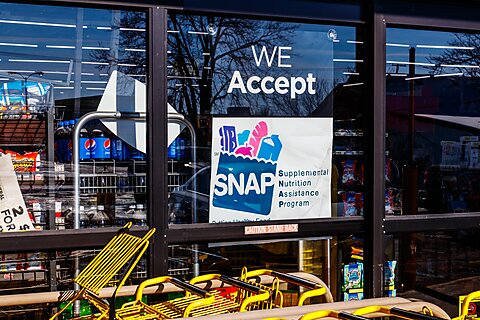Romina Boccia and Tyler Turman
US Department of Agriculture (USDA) Secretary Brooke Rollins made headlines last week after proposing that all 41.7 million beneficiaries of the Supplemental Nutritional Assistance Program (SNAP) reapply to crack down on fraud and “fundamentally rebuild” the program. The USDA has since backtracked, saying it will instead continue to work with states using their existing recertification procedures.
Rollins is right to want to curb ineligible enrollment, but whether the USDA forces over 40 million people to reapply or continue with business as usual won’t make much of a difference. SNAP’s structural incentive problems encourage states to be lax with their verification standards because the federal government foots the bill for the program’s benefits costs. If the goal is to strengthen program integrity, the solution isn’t more paperwork. Instead, Congress should give states greater financial responsibility over how they run their programs.
SNAP’s Recertification Problems
SNAP already requires periodic recertification, in which beneficiaries must update their income, employment, residency, and household composition so state agencies can ensure that they continue to fulfill the program’s eligibility requirements.
The USDA provides general guidelines for recertification, but states have significant flexibility in determining how frequently households must recertify, which reporting system they use, what types of changes must be reported, and how rigorously they verify information.
Moreover, the USDA already requires states to match their SNAP data with the Social Security Administration’s (SSA) Death Master File to ensure benefits aren’t collected under the names of deceased persons. If “186,000 dead people are receiving SNAP benefits” as Rollins claims, it could be because the current recertification procedures are inadequately or unevenly enforced by the states. Asking states to repeat the same process will likely not catch these mistakes.
A short-term solution could be to require states to implement stricter eligibility verification procedures and increase their frequency for certain populations—for example, by requiring able-bodied adults to recertify every three months. To remedy the issue Rollins raises about 500,000 people allegedly being doubly enrolled, Congress could expedite state adoption of the National Accuracy Clearinghouse (NAC). The NAC is an interstate data-matching system implemented in 2024 to prevent individuals from receiving SNAP benefits in multiple states. Although all states are required to adopt it by October 2027, only 11 have done so thus far.
But these are ultimately Band-Aid solutions that won’t address the underlying incentive misalignment in SNAP’s funding structure.
Structural Problems Require Structural Solutions
Currently, the federal government evenly splits administrative costs with the states but pays 100 percent of SNAP’s benefits costs. So, when a state processes applications, conducts interviews, verifies documents, and manages recertification, it’s responsible for at least half of those costs. But when benefits go out the door, the federal government covers every penny.
This gives states every reason to cut paperwork and little reason to police eligibility because Washington pays every dollar in benefits. States get an “all gain, no pain” arrangement in which they run the program but bear almost none of the financial risk when errors or fraud slip through.
States would have stronger incentives to enforce eligibility rules and adopt better fraud-prevention practices if they were responsible for SNAP benefits costs. The One Big Beautiful Bill Act made progress on this by requiring states to pay for a portion of SNAP’s benefits costs if they have high payment error rates, beginning in fiscal year 2028. Congress should take it a step further by block-granting SNAP and gradually phasing down the federal government’s share of SNAP benefits to shift the fiscal responsibility to the states while reducing federal involvement in welfare provision.
If the goal is a SNAP program that is both effective and accountable, the solution is clear: Congress must empower states to manage their own programs and hold them financially accountable for the consequences of their decisions.
Rollins promises that “structural changes to SNAP” will be unveiled the week after Thanksgiving. But unless those reforms realign financial incentives and give states genuine skin in the game, expect more rhetoric about combating fraud and little meaningful change. Mass recertification won’t fix SNAP—only real accountability for states will.
















